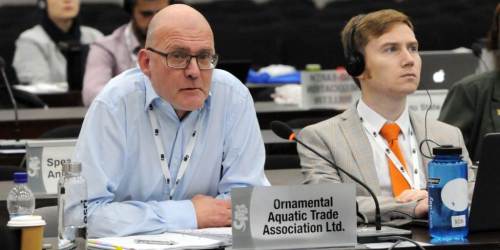
A critical assessment of the global trade in marine aquarium (ornamental) species for CITES (Convention on International Trade in Endangered Species of Wild Fauna and Flora) has been postponed for two years as data is being gathered and terms of reference for future decisions are thrashed out.
via Ornamental Aquatic Trade Organization (OATA)
OATA SPEAKS UP AT CITES COP
On the agenda for CITES COP19 meeting yesterday (November 16) was an update on its proposal to examine the conservation of and trade in marine ornamental fish. This is a far-reaching proposal which could have a big effect on our industry.
It had been expected that research reports and a workshop to examine the trade in marine fish would have been concluded before the 2022 Conference of the Parties (COP) meeting. But Covid-19 and funding issues have held up the timetable. So this workstream has now been given more time to conclude, with the item to return to the next CoP in two years’ time when progress has been made.
We were pleased to see the intervention by Defra (on behalf of the UK) which recommended the need for a terms of reference to be established for the forthcoming workshop, which was accepted. It was also heartening to hear a recognition of the importance of trade engagement with this proposal from a number of speakers, including UNEP-WCMC (World Conservation Monitoring Centre).
Our Chief Executive Dominic Whitmee was there to speak on behalf of the global ornamental fish industry, as well as pet-keeping organizations during the debate. He emphasized the need for good quality data to enable CITES to make informed decisions and that progress is being made on this (see this paper submitted by Cefas UK on UK trade). You can read what he said here.
After the debate he said: “Overall, we should be pleased with the outcome here. The key issues for me are that we have agreement around transparency, particularly the acceptance of the need to develop Terms of Reference for the workshop being planned – that was a welcome intervention by the UK on this. Also, the acknowledgment that it’s important to have the engagement of industry in the process and the need for good quality data. The global industry has been emphasizing that since the beginning and evidence is now available on the trade in marine ornamental fishes.”
It is not ideal that this proposal is taking so long to conclude, however, our aim is always to ensure decisions are made on the best data and science for the benefit of people and the planet. More time is certainly needed to ensure this will happen so we support this extension. Establishing Terms of Reference for the workshop is also a welcome addition because transparency about what the workshop should be achieving and how it does this is key.
We, along with OFI, will continue to offer our support to all that is planned for this proposal and to continue to press for clarity and transparency about how this project will progress.
You can find out more about what’s planned here.
###





Trackbacks/Pingbacks